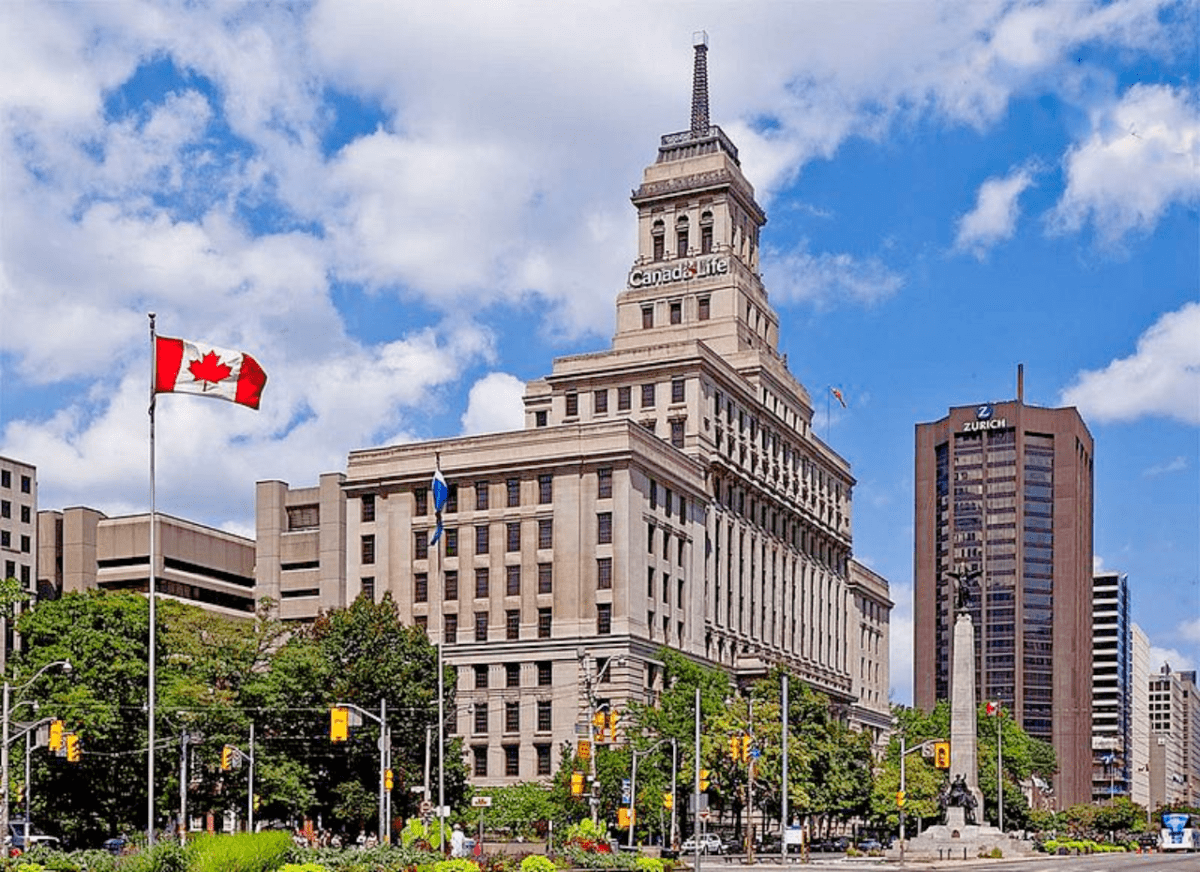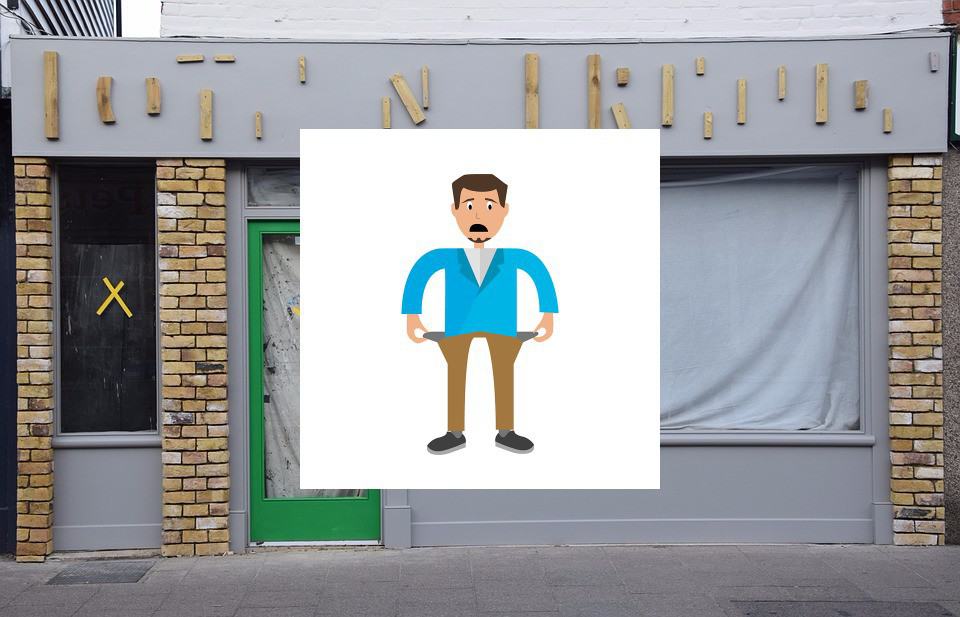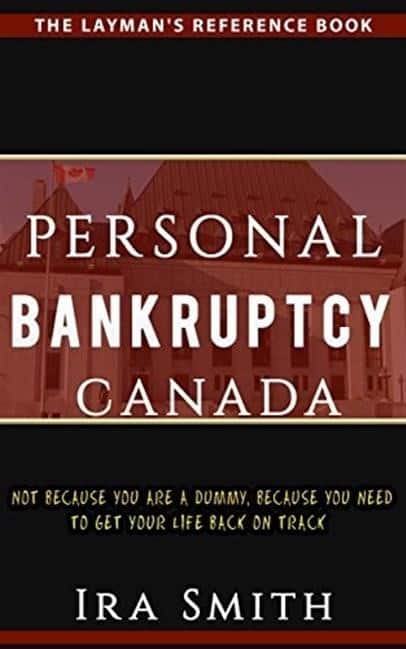
330 University Avenue: Introduction
On the west side of University Avenue and immediately north of Queen Street, lies 330 University Avenue, in Toronto’s core. This University Ave. building is known as the Canada Life Building. Work on the building began in 1929 for the brand-new head office of the Canada Life Assurance Company and it opened up in 1931. It was the 4th structure to act as the head office of Canada Life. Most noteworthy is that this company was Canada’s earliest, as well as the biggest insurance provider.
330 University Avenue: Brief building history
The development of this fifteen-floor Beaux Arts structure was by Sproatt & Rolph. It stands at 285 feet (87 m), 321 feet (97.8 m) including its famous weather beacon. This building was the very first of scheduled buildings along University Avenue, however, the Great Depression stopped those plans. When it finished, it was among the highest structures in Toronto. It stays one of the biggest office complexes in Toronto with windows that tenants can open. In 1997, Toronto City Council designated the building a heritage property.
330 University Avenue: The most noticeable part of the building
The weather beacon was added in 1951. Its colour codes sum up the weather report at a look. Environment Canada out of Toronto Pearson International Airport revises the weather details 4 times each day.
The top light indicates:
Consistent green = clear
Stable red = overcast
Blinking red = rainfall
Blinking = snow
The white lights along the tower show:
Lights rising = warmer
Lights running down = colder
Solid = consistent temperature level/ No adjustment
During the day, the weather tower shows the weather for that day. The evening signals show the weather for the next day.
330 University Avenue: 330 university avenue 8th floor
But enough of the history lesson. Maybe you didn’t come to this vlog to learn about the building’s history; I will now change the focus. On the 8th floor are the courtrooms. These Courts are presided over by Judges of the Superior Court of Justice Toronto Region. All corporate insolvency matters, certainly not just corporate bankruptcy matters, are part of what is known as the Commercial List.
Personal bankruptcy in Toronto Ontario is normally first heard in a different Court up the street at 393 University Avenue before a Registrar in Bankruptcy. The Registrar is a Master of the Court hearing bankruptcy matters. Most importantly, a Commerical List Judge in 330 University Avenue, Toronto Ontario M5G 1R8 must hear any appeal of a Registrar’s decision. This is for the reason that is what the rules state.
330 University Avenue: The corporate insolvency matters overview
The Court at 330 University deals mainly with corporate insolvency matters. Examples are:
- Corporate receivership – appointment of a receiver, motions by the receiver or a stakeholder requesting approval for specific relief, approval motions for sale of assets or fee and costs of the receivership administration, and above all, the receiver’s discharge application.
- Corporate restructuring – all motions for bankruptcy protection and restructuring of a company under the Companies’ Creditors Arrangement Act (CCAA), motions by the Court-appointed monitor or a stakeholder requesting approvals, approval motions for the Restructuring Plan of Arrangement including voting rights of all stakeholders, approval of the implementation of the Plan of Arrangement, approval of the fee and costs of the CCAA administration, monitor’s discharge application.
- Personal and Corporate bankruptcy matters – as indicated above, these would mostly be either an appeal from Registrar in Bankruptcy’s decision or an opposed matter that the Registrar was not allowed to hear under the bankruptcy rules.
330 University Avenue: Do I need a lawyer to appear at 330 University Avenue?
Corporations are not a human being, so they cannot show up in Court and speak. Therefore, a company requires a person to act on its behalf. Although a shareholder or officer and director authorized to speak on behalf of the company can represent the company in Court, it is not advisable.
I say this because the legal matters heard are most complex. As a result, an experienced insolvency lawyer is necessary to properly represent the position of either the company or a stakeholder.
The licensed insolvency trustee (formerly known as trustee in bankruptcy) who is acting as the receiver, monitor or trustee, similarly will have a competent insolvency or bankruptcy lawyer acting on its behalf. Motion filings always include very detailed reports.
Complex text, financial calculations and detailed exhibits will form part of the filed material. Most laypeople would need both an independent licensed insolvency trustee as a financial advisor, as well as an experienced corporate insolvency lawyer on their team. Therefore, the costs can mount quickly.
330 University Avenue: Is your company going to be in Court either for a restructuring or as a stakeholder?
Is your company dealing with severe economic problems and you aren’t sure what to do? There’s no embarrassment in looking for specialist, financial advice. As a licensed insolvency trustee, the Ira Smith Team can check your company’s circumstances and assist you to get to the most effective solution to solve your company’s financial issues. Several of our successful case studies can be found on our website.
Ira Smith Trustee & Receiver Inc. is here to assist. The government licenses and supervises us. Hence, to keep our license in good standing, we must adhere to a stringent code of ethics. We are well-known to the Judges at 330 University Avenue and all the Toronto insolvency lawyers.
I know the pain and discomfort you are in because of your corporate financial problems. You will certainly discover that we use a pleasant, non-judgmental technique in understanding you, your goals and in restructuring your company.
Give me a phone call today and allow me to address your economic issues Starting Over, Starting Now.











